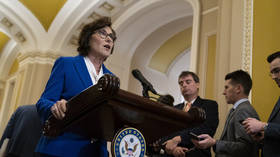Republicans grill university heads on campus anti-Semitism
Some schools have been accused of tolerating hateful demonstrations related to the Israel-Hamas conflict
The presidents of Harvard University, the Massachusetts Institute of Technology (MIT) and the University of Pennsylvania were called to testify before Congress about the rise of anti-Semitism on college campuses, insisting they have worked to tackle bigotry.
The three administrators appeared for a hearing held on Tuesday by the GOP-led House Committee on Education and the Workforce, where they were asked to explain steps taken by their universities to combat anti-Semitism.
Claudine Gay of Harvard acknowledged difficulties in balancing students’ free speech rights while also protecting minority groups from hate, but said the elite school did not tolerate “speech that incites violence, threatens safety, or violates Harvard’s policies.”
Citing a wave of pro-Palestine protests on US campuses since the latest Israel-Hamas war erupted in October, committee chair Virginia Foxx said the hearing would give the college presidents a chance to “atone for the many specific instances of vitriolic, hate-filled anti-Semitism on your college campuses that have denied students the safe learning environment they’re due.”
While Gay noted that Harvard had stepped up security and denounced Hamas’ deadly October 7 terrorist attack on Israel, Foxx said those efforts were not enough, accusing the administrators of “allowing horrific rhetoric to fester and grow.”
Penn University’s Elizabeth Magill also accepted that her school could do more to fight hate speech, but stressed the danger of other forms of bigotry beyond anti-Semitism alone.
“Today’s hearing is focused on anti-Semitism and its direct impact on the Jewish community. But history teaches us that where anti-Semitism goes unchecked, other forms of hate spread and ultimately can threaten democracy,” she said in her opening statement.
Magill added that her university had created a special task force to produce additional recommendations on combating campus bigotry, but stated that universities “need both safety and free expression.”
MIT president Sally Kornbluth similarly argued that only more free speech, not less, could solve the problem, saying that those seeking to shut down protests were effectively pushing for “speech codes,” which she said did not work.
“Problematic speech needs to be countered with other speech and education,” Kornbluth added.
The committee hearing came amid rising fears of anti-Semitic reprisals in the US and beyond. A surge in crimes targeting Jews has been reported across the Western world during the latest round of fighting in Gaza, including a number of bomb threats against synagogues and other Jewish institutions. Several apparent hate crimes against Palestinians and Muslims have also been reported in recent weeks.
You can share this story on social media:








Comments are closed.